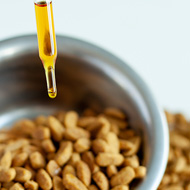Researchers discover 'promising' new treatment for canine epilepsy

Adding MCT oil to a dried-kibble diet may reduce epileptic seizures and improve a dog's quality of life.
Researchers at the Royal Veterinary College (RVC) have discovered a promising new treatment for hard-to-treat canine epilepsy.
Scientists tested the effects of an oil supplement on seizure frequency in dogs with drug-resistant epilepsy. They found that adding the oil to a dog's existing diet reduced seizures and improved quality of life for both dog and owner.
The research was funded by The American Kennel Club Canine Health Foundation and is published in the Journal of Veterinary Internal Medicine.
Dr Rowena Packer, BBSRC Research Fellow at the RVC said: “Our novel findings indicate that a relatively small change to the diet of dogs’ with hard-to-treat epilepsy can potentially reduce the number of seizures they have, while also improving their medication side effects and overall quality of life.”
The study built on previous research that found the oil contained a specific type of fat (medium-chain triglycerides (MCT)) that could have beneficial effects when added to a dried-kibble diet.
The oil was tested during a rigorous trial, in which 28 dogs received the MCT oil for three months and a placebo oil for three months. Neither the researchers or the dogs' owners knew which oil the dogs were receiving at any given time.
Overall, they observed that dogs had significantly fewer seizures during the MCT phase compared to the placebo phase, and improved owner-reported quality of life.
Dr Packer adds: “Epilepsy is often a challenging and distressing condition for dog owners to manage, particularly when dogs don’t respond to anti-seizure medications in the way their owner and vet might have expected or hoped.
“Historically, diet has not been considered a key part of epilepsy management, but along with other recent findings, these results indicate that nutrition likely plays an important role in seizure control.”



 The RCVS has announced a new version of its 1CPD mobile app, with enhanced features for veterinary surgeons and veterinary nurses to record their continuing professional development.
The RCVS has announced a new version of its 1CPD mobile app, with enhanced features for veterinary surgeons and veterinary nurses to record their continuing professional development.